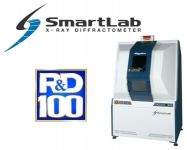Engineered for Performance
The system incorporates a high resolution θ/θ closed loop goniometer drive system, cross beam optics (CBO), an in-plane scattering arm, and an optional 9.0 kW rotating anode generator.
Designed for Flexibility
Coupling a computer controlled alignment system with a fully automated optical system and the Guidance software makes it easy to switch between hardware modes, ensuring that your hardware complexity is never holding back your research.
Functionality Redefined
Whether you are working with thin films, nanomaterials, powders, or liquids the SmartLab will give you the functionality to make the measurements you want to make when you want to make them.
Features:
- Full automated alignment under computer control.
- Optional in-plane diffraction arm for in-plane measurements without reconfiguration.
- Focusing and parallel beam geometries without reconfiguration.
- SAXS capabilities









 Print
Print Sent by email
Sent by email



